African American History Tours in Washington, D.C.
With its historic streets and museum dedicated to black culture, Washington, D.C. is the ideal destination to learn about the African American history community, and how it has shaped the nation’s capital, from the city’s founding in the 18th century to the modern day.
African American history tours in Washington, D.C. enable you to dive deep into the city’s black heritage, as well as significant events and figures that contributed to the end of slavery.
With its historic streets and museum dedicated to black culture, Washington, D.C. is the ideal destination to learn about the African American history community, and how it has shaped the nation’s capital, from the city’s founding in the 18th century to the modern day.
African American history tours in Washington, D.C. enable you to dive deep into the city’s black heritage, as well as significant events and figures that contributed to the end of slavery.
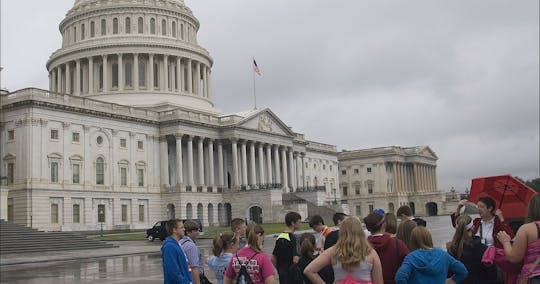
(0/24) checking Musement...
With its historic streets and museum dedicated to black culture, Washington, D.C. is the ideal destination to learn about the African American history community, and how it has shaped the nation’s capital, from the city’s founding in the 18th century to the modern day.
African American history tours in Washington, D.C. enable you to dive deep into the city’s black heritage, as well as significant events and figures that contributed to the end of slavery.
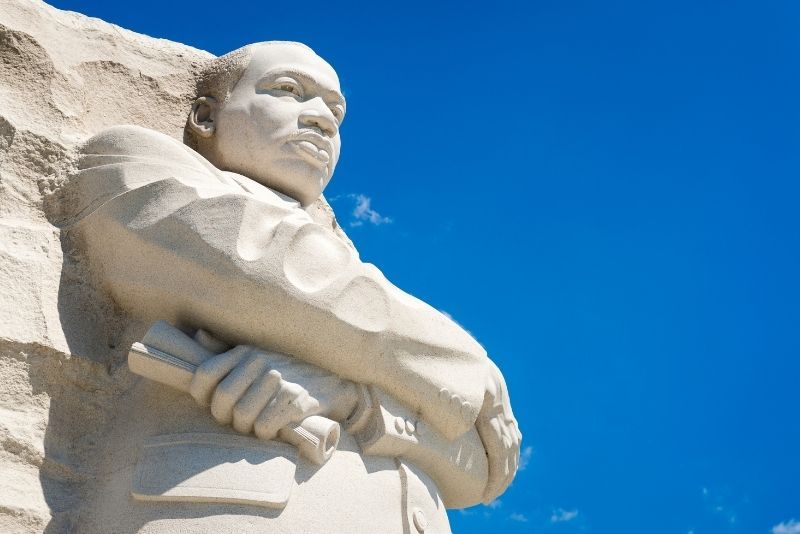
Below, you can find everything you should know about booking African American history tours, one of the most captivating options for sightseeing tours in Washington, D.C.
What are the most popular African American history tours in Washington, D.C.?
African American history tour in Washington, D.C.
After meeting at the United States Navy Memorial, you’ll travel around Washington, D.C. to discover its rich African American history. You’ll visit a number of landmarks and monuments, including the Emancipation Statue, which honors Abraham Lincoln for his efforts to end slavery.
The statue depicts the 16th President of the U.S. holding his proclamation while a slave at his feet breaks free of his shackles.
You’ll also visit the Howard Theatre, which opened at the beginning of the 20th century and hosted a number of African American superstars, including Aretha Franklin, Ella Fitzgerald, and Billie Holiday.
See the former home of Frederick Douglass — a leader of the abolitionist movement who escaped from slavery himself — before discovering Howard University, one of the most renowned black colleges in the country, founded in 1867. Pay your respects to Mary McLeod Bethune at a memorial dedicated to the passionate educator and activist who was an important figure in the civil rights movement.
Among other attractions you’ll see on this tour is U Street, which was once considered the African American historical center of the city. Learn about the struggles of the black community through the African American Civil War Memorial before making your way to the downtown area of Washington, D.C. where you’ll find even more monuments and landmarks associated with the African American community.
After discovering several more attractions, you’ll finish up at the National Museum of African American History and Culture, where you’re free to roam at your leisure, and dive even deeper into North America’s colorful past,and the events that have shaped the black society of the U.S.
National Museum of African American History and Culture private tour in Washington, D.C.
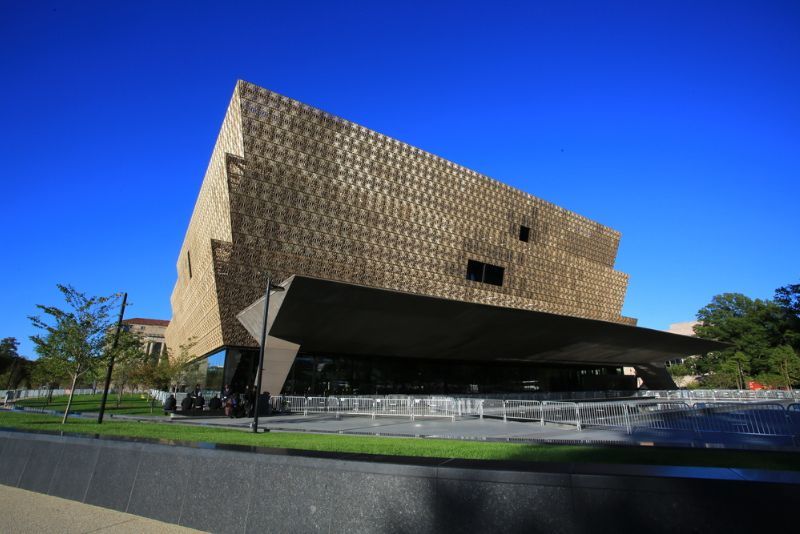
If you prefer to experience Washington, D.C.’s deep cultural roots under one roof, head to the National Museum of African American History and Culture, and engage in a private tour.
You’ll benefit from the one-to-one attention of your own dedicated guide and you’ll be able to discuss each exhibit in a friendly, and informative way. You can also ask any questions that spring to mind, making this a much more customizable and personal experience than a group excursion allows.
Another benefit of this type of excursion is that it is suitable for all age groups meaning that everyone in your family, including children, will find the commentary engaging.
Among the artifacts inside the museum include photographs related to the Civil Rights movement, as well as clothing related to the more recent “Black Lives Matter” campaign, which began in 2013 and gained traction during the COVID-19 pandemic, after the death of George Floyd.
Walking African American history tour in Washington, D.C.
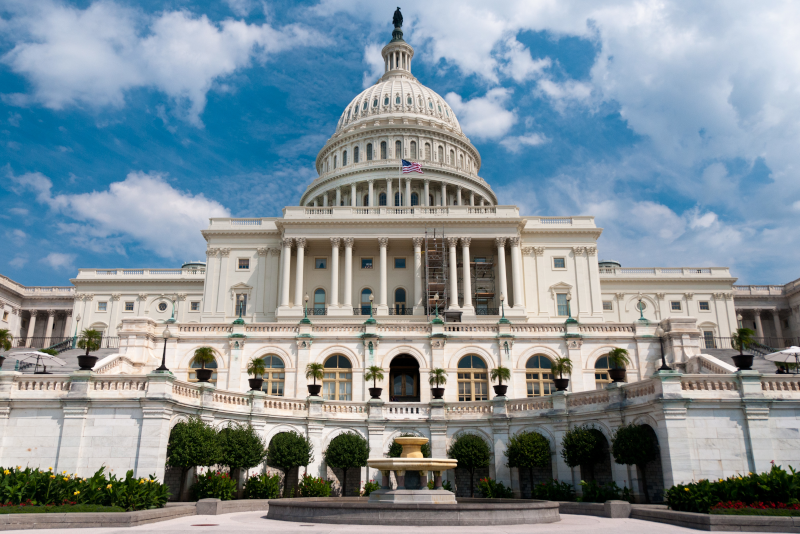
This African American history walking tour in Washington, D.C. explores the U Street area, often referred to as the “Black Broadway.” This bustling modern neighborhood of the city has deep roots as Washington’s main African American district since the Victorian era.
While other tours dive into the struggles for justice that have concerned the black community of the U.S. for the last several centuries, this excursion focuses on the celebration of the African American music and culinary scenes.
You’ll learn about Duke Ellington, known as one of the greatest jazz composers of the 20th century, through a monument that pays tribute to his life.
Wandering through the district, you’ll also discover dishes from around the world, from African American staples, often nicknamed “soul food,” as well as culinary delights from Europe and Africa.
Which places are visited?
National Museum of African American History and Culture
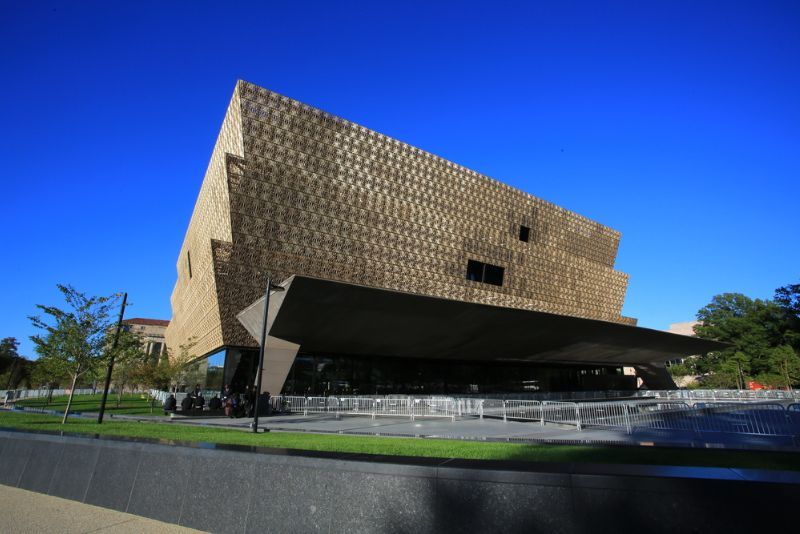
The National Museum of African American History and Culture is operated by the Smithsonian, and is the country’s largest museum dedicated to black history. Originally founded in 2003, the exhibition formally opened in its current location in 2016.
The 44th President of the U.S. — Barrack Obama — led the opening ceremony of this venue securing it as an important landmark in African American culture. While the foundation owns a collection of around 37,000 objects dedicated to African American history, you’ll have the opportunity to see approximately 3,000 of them on a visit to the museum.
Howard Theatre
The Howard Theatre has been on the National Register of Historic Places since 1974 because of its association with a multitude of the greatest names in the African American music scene of the 20th century.
Originally founded by the white-owned National Amusement Company, the venue became popular with the black community after Duke Ellington performed there in a bid to get the theater back on its feet after the Great Depression. The Howard Theater closed in 1970 but was reopened just 3 years later and still hosts a range of black artists today.
What are the prices of African American history tours in Washington, D.C.?
The most budget-friendly African American history tour in Washington, D.C. takes place on foot and journeys through the U Street district. This type of excursion costs between US$20 and US$30 per adult, and children under 4 travel for free.
An African American history tour in Washington, D.C. that travels around the destination by bus costs US$90 per adult, while children between the ages of 3 and 12 cost just under US$80 each. Military personnel can also benefit from a discounted rate of US$80 while children under 3 incur no additional fee.
Alternatively, you can choose to make this tour into a private affair for up to 12 guests for an additional fee.
Private tours of the National Museum of African American History and Culture cost US$350 per group of up to five participants, which breaks down to US$70 each.
What is included?
Most city tours in Washington, D.C. include the services of a knowledgeable guide, as well as admission to the National Museum of African American History and Culture. You’ll typically stroll the museum alone after completing your tour of Washington’s streets.
However, if you opt for a private trip, you’ll be accompanied around the venue, which enables you to learn more about the African American history of the U.S.
Where do the tours start?
African American history tours in Washington, D.C. begin at a variety of destinations across the city, depending on which landmarks you will be visiting. These include the U.S. Navy Memorial Plaza and the National Museum of African American History and Culture.
You can find out the starting location of each tour before booking, and, upon arrival at this destination, your guide will typically be wearing or holding an item that makes them easily recognizable.
How long does an African American history tour last?
African American history tours in Washington, D.C. generally last between 2 and 4 hours. This gives you enough time to explore the main highlights of the diverse city and how it celebrates the black community, as well as the long, and arduous journey its residents have been through to gain acceptance over the centuries.
Are these tours accessible to wheelchair users?
While some black history tours in Washington are suitable for wheelchair users, others are not. Because of this, you should consult the booking page of your preferred excursion to see whether it is accessible for every member of your party. If not, you can simply choose another that is more fitting for your group.
When is the best time to go on an African American tour in Washington, D.C.?
The best time for an African American history tour in Washington, D.C. is during Black History Month in February, where there are numerous special events, exhibitions, and programs that celebrate and highlight African American history and culture in the nation's capital.
Are children welcome on these tours?
African American history tours in Washington, D.C. allow children with an accompanying adult, and when needed, infants must sit on laps.
Travel tips
- Research and book African American history tours in advance, especially during peak seasons.
- Wear suitable attire for walking and the weather, as tours may involve outdoor exploration.
- Respect the history and engage with the tour guides to gain a deeper understanding of African American history.
- Show respect during discussions on the tour, fostering a positive learning experience.

